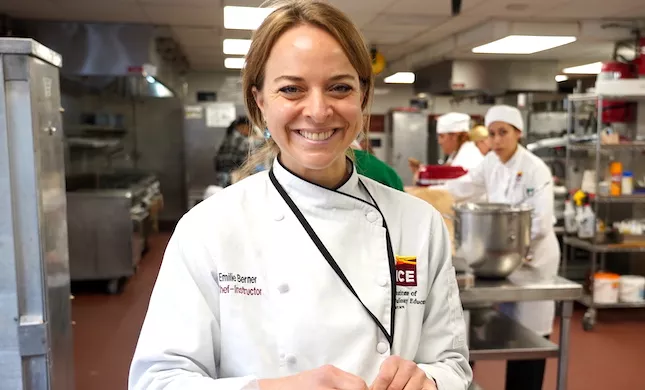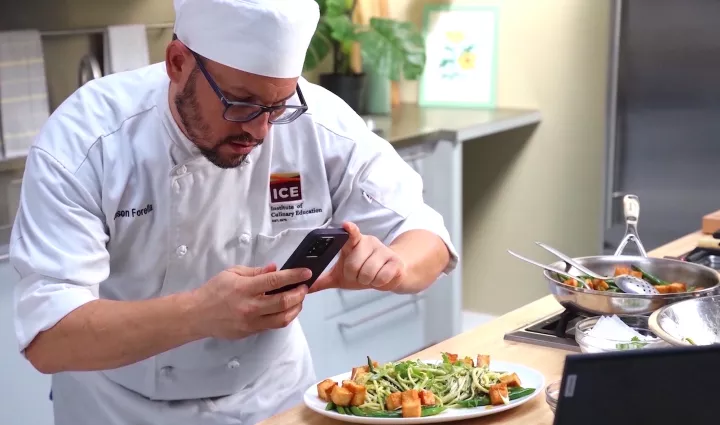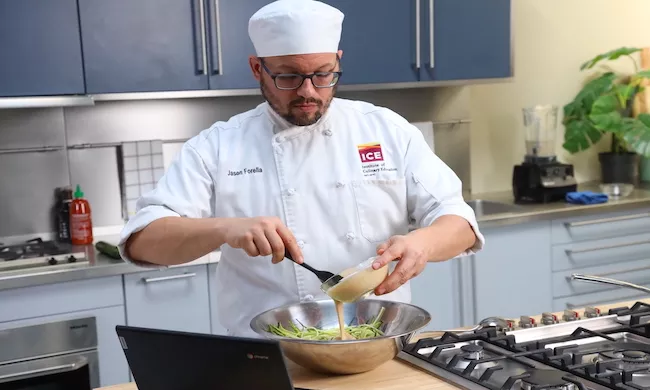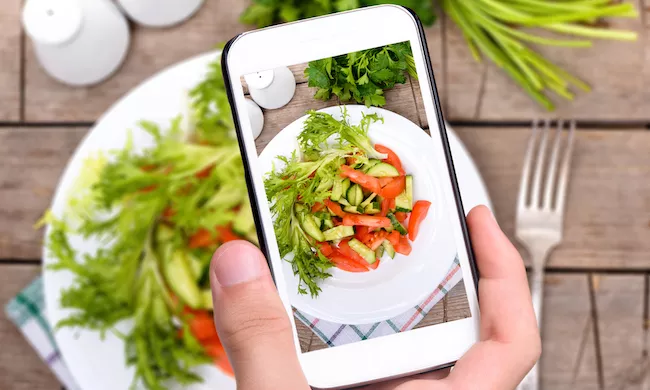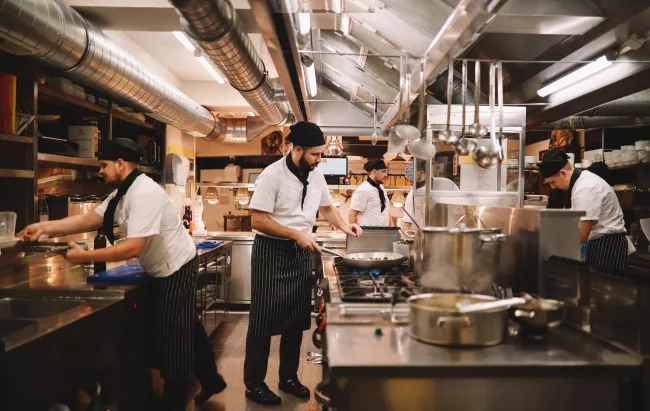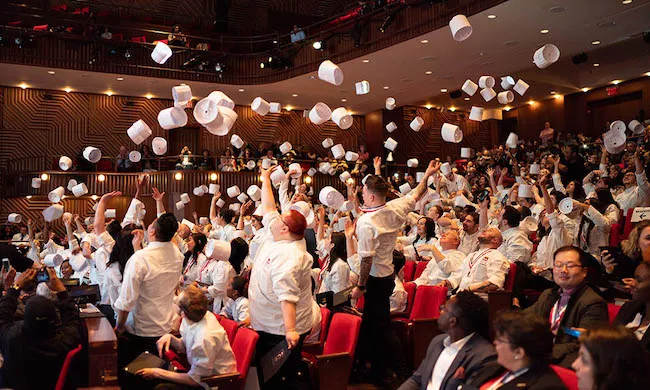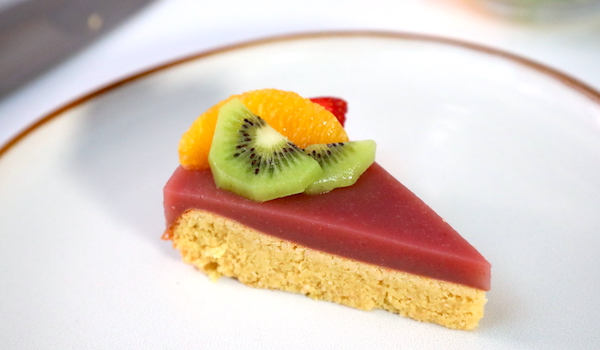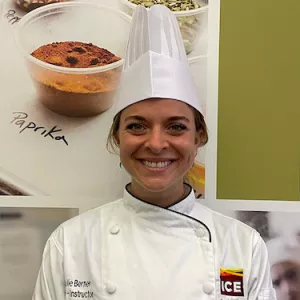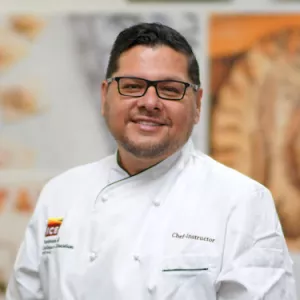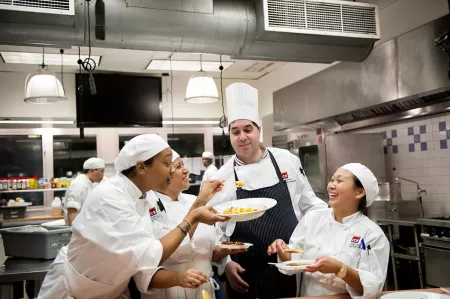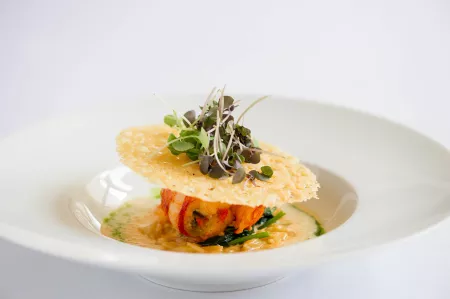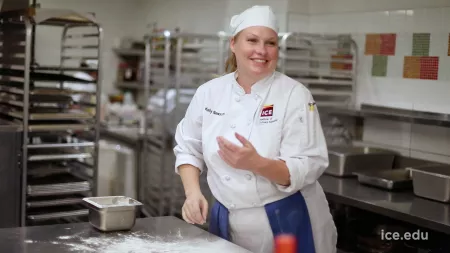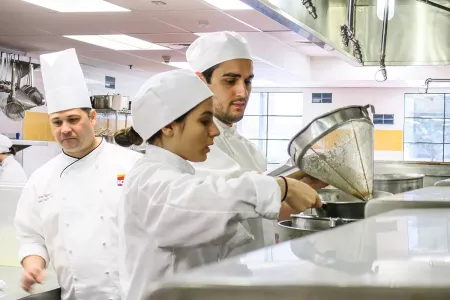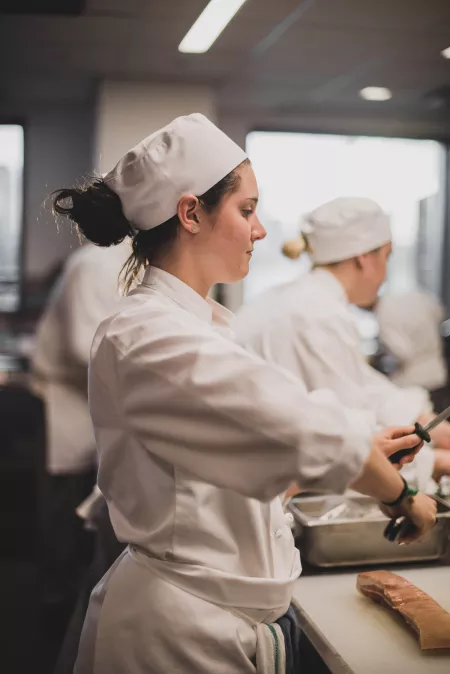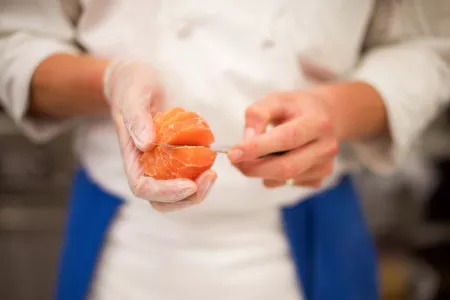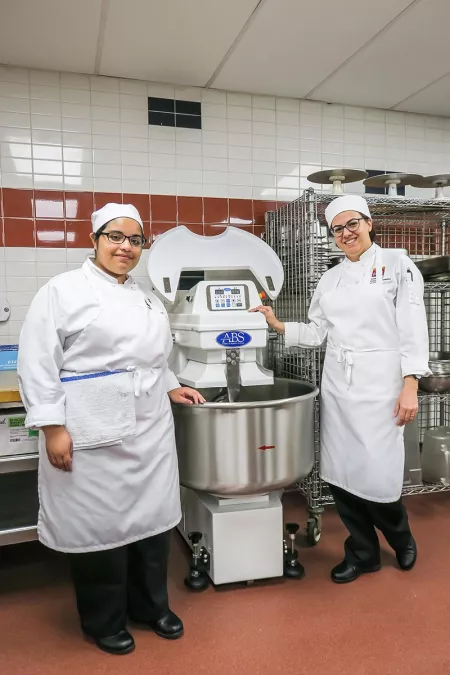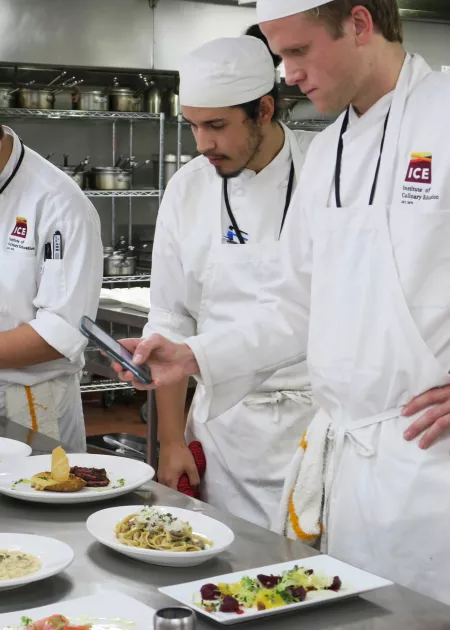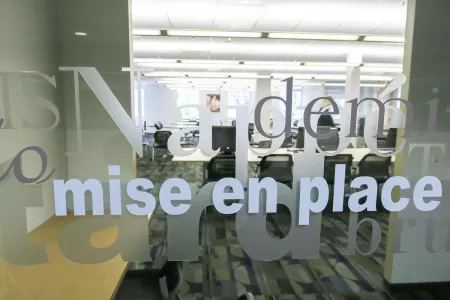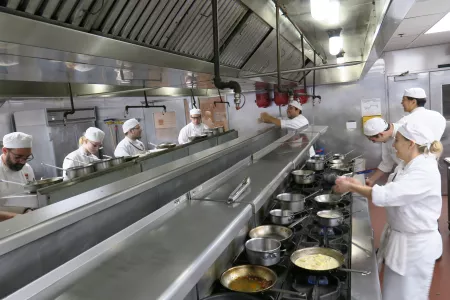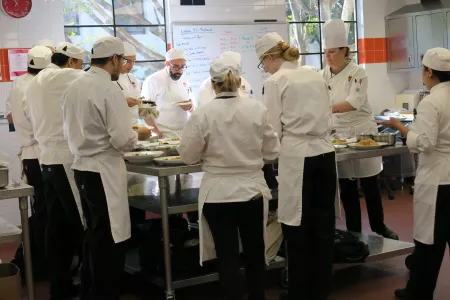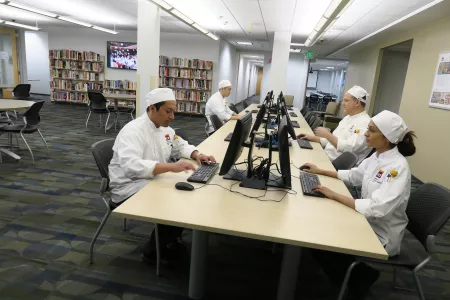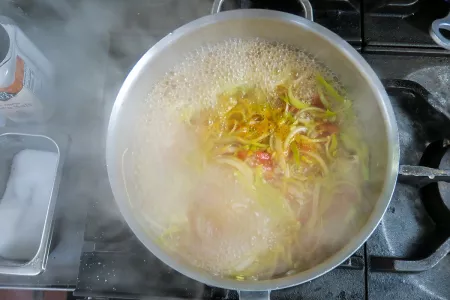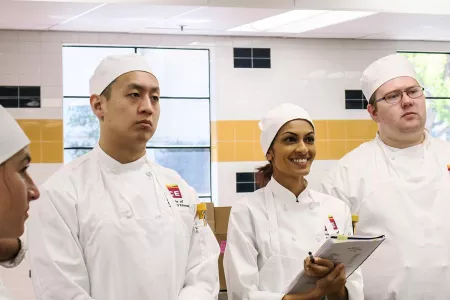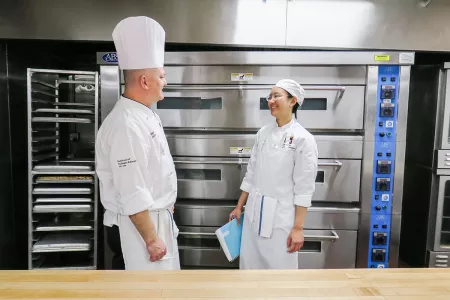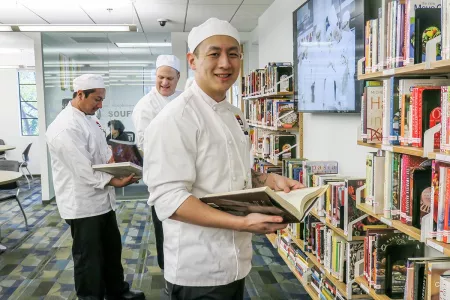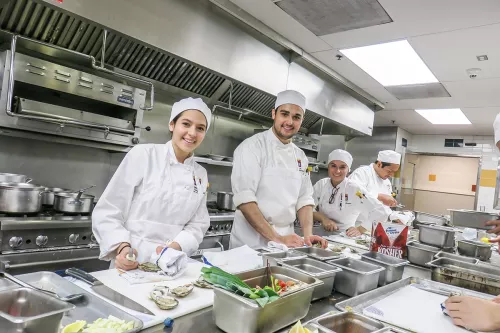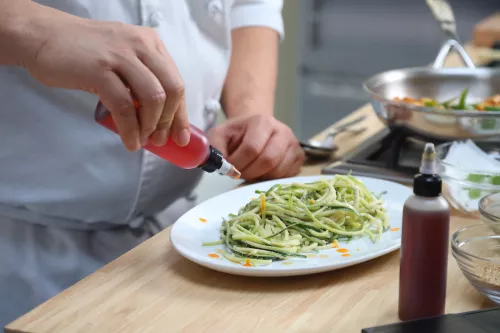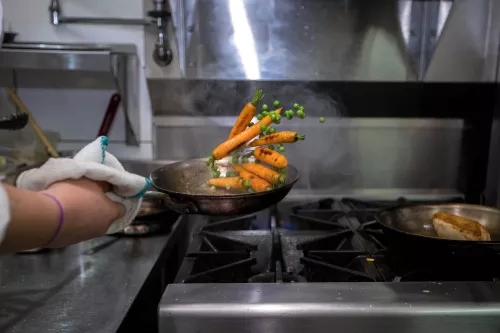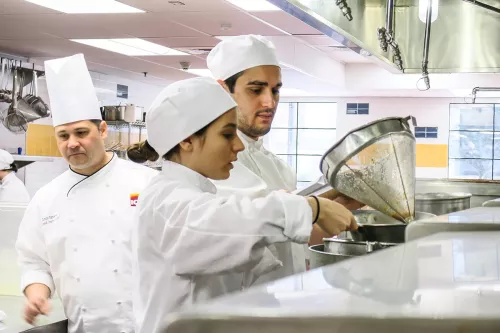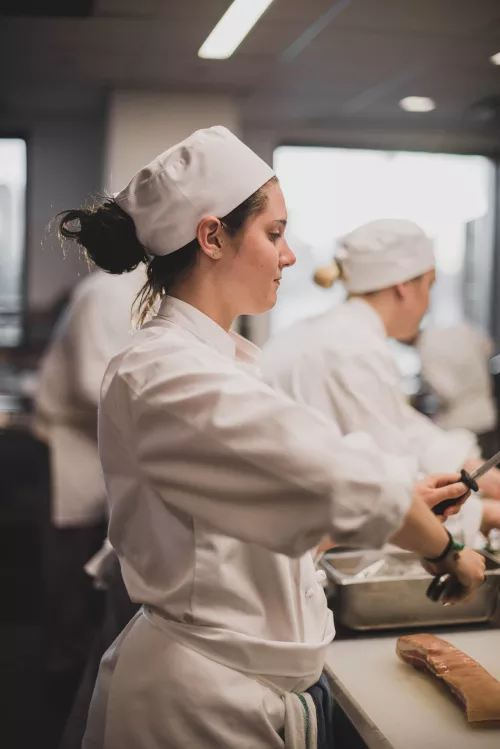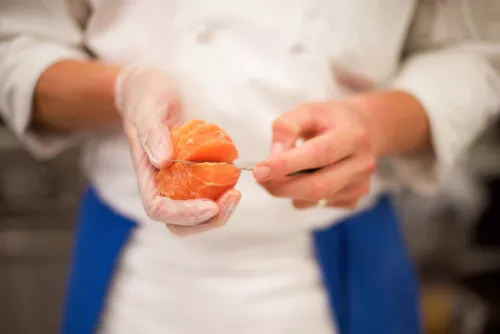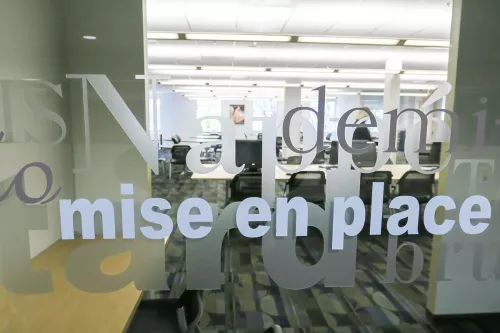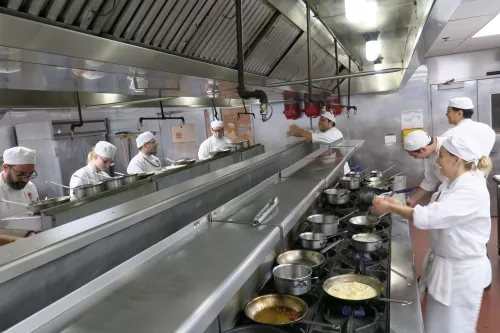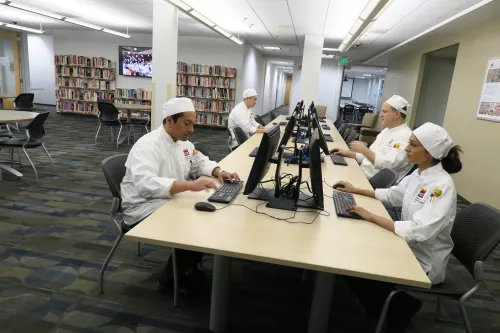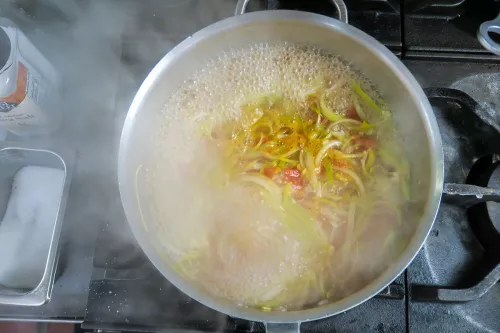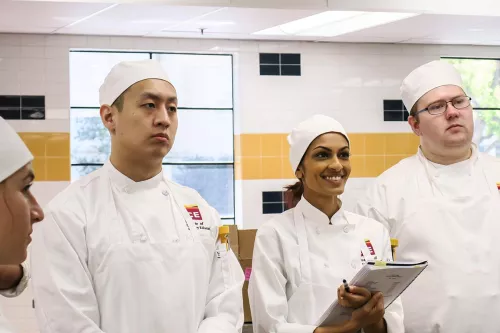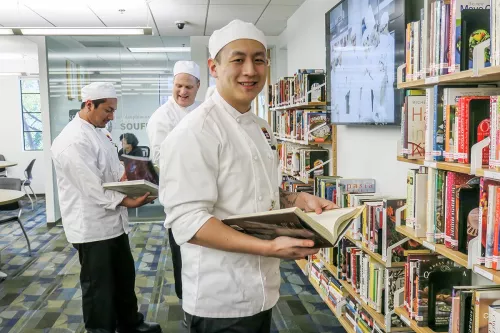Course 1
INTRODUCTION TO ONLINE LEARNING & RESTAURANT REALITIES
13 hours
This course is designed to familiarize students with best practices for success in our online programs and in the restaurant industry.
Topics include:
- An introduction to the learning management system
- Tools for success regarding internet research and time management
- The expected tenets of professionalism in the food service industry
Course 2
CULINARY FUNDAMENTALS
90 hours
Focusing on fundamental culinary techniques and criteria for selecting quality ingredients, this course will offer an introduction to the foundation for preparing health-supportive, whole-foods cuisine. We will also teach stock, soup and sauce preparations.
Course highlights:
- Introduction to classical techniques: poach, simmer boil, blanch, steam, shock, braise, stew, puree, sweat, caramelize, deglaze, dredging, pan fry, stir fry, bake broil, toast, roast, grill, sauté
- Stock, sauce, soups & stews
Dishes include:
- Rich tempeh bordelaise with slow-braised cabbage and creamy pomme puree
- Roasted curry squash soup with infused turmeric oil, topped with broiled peppers & toasted pepitas
- Spicy mapo tofu with gently steamed rice & braised fennel
Course 3
CONCEPT DEVELOPMENT & MENU DESIGN
21 hours
This course is designed to acquaint students with the realities of a culinary business by exploring concept — from creativity to profitability. By surveying the industry, students explore all types of operations and analyze concepts, as well as research feasibility and location selection. Students gain the knowledge required to develop and refine their ideas.
This course also gives a comprehensive view of key aspects of the menu, including planning, pricing, layout, and design. Students prepare sample menus as a project.
Course 4
PLANT-BASED COOKING TECHNIQUES 1
60 hours
In this course, we continue education on plant-forward cuisine to include a variety of whole foods and share innovative ways to work with vegetables. This course show students how to put plants at the center of the plate and make them the star of the dish.
Course highlights:
- Working with bulbs & cruciferous vegetables
- Leafy greens & mushrooms
- Root vegetables & squash varietals
- Mastering sea vegetables
Dishes include:
- Jackfruit pulled pork sandwich with zucchini fries and romesco sauce
- Slow simmered vegan cassoulet & country-style celery root salad
- Tofu & mixed vegetable stir fry with kelp noodles, hijiki “caviar,” & gomasio
- Cheesy mushroom gratin, stuffed and steamed collard leaves topped with crispy shiitake “bacon”
Course 5
FOODSERVICE FINANCE
30 hours
A working understanding of numbers is critically important to culinary success. The curriculum for this course focuses on the use of financial statements as a tool for control and decision-making, with emphasis on budgets, industry standards and variation analyses.
Topics include:
- How to create and manage balance sheets and statements of net income
- An introduction to break-even analysis, cash flow, and financing
- Examination of real-life case studies
Course 6
PLANT-BASED COOKING TECHNIQUES 2
60 hours
In this course, we prepare items featuring whole grains, beans, vegetables and non-dairy alternatives. We also teach how to ferment, pickle and sprout foods, as well as how to make alternative cheese & plant-based butter.
Course highlights:
- Beautiful beans & grains
- The art of fermentation, pickling, sprouting
- Alternative cheeses & butter
Dishes include:
- Soft polenta with mushroom ragu & parsley salad
- Falafel with whipped hummus, chickpea flatbread, & tahini yogurt sauce
- Carrot “lox” crostini with creamy vegan cashew cheese
- Spiced black bean burgers with chimichurri herb sauce, curtido slaw & charred iceberg lettuce
Course 7
NUTRITION & WELLNESS
27 hours
In this course, students receive an introduction to the study of the principles of human nutritional needs. Students examine current dietary guidelines, the function of nutrients, and dietary preferences. The course highlights the relationship between diet, health, disease and how applied nutrition can benefit not only immune-challenged populations, but average healthy populations as well.
Topics include:
- Modifying existing menus and dishes to optimize nutritional content
- Insight into balancing the current trends in nutritional study with culinary and baking techniques
Course 8
PLANT-BASED COOKING TECHNIQUES 3
60 hours
In this course, students apply their growing command of health-supportive techniques to protein sources. Protein comes in a variety of forms – both plant and animal. We teach how to prepare soy foods and eggs in a health-conscious way, and how to work with store-bought protein alternatives.
Course highlights:
- Classic egg techniques
- Working with tofu, tempeh and seitan
- Plant-based protein alternatives
Dishes include:
- Eggs Florentine: poached eggs on a toasted English muffin with freshly made hollandaise sauce and wilted spinach
- Hand-made tofu and mixed baby greens with a creamy tofu horseradish dressing
- Charred stuffed poblano pepper with pan-seared tempeh sausages & grits
- Smoky nut “chorizo” tacos, grilled pineapple salsa & hand-pressed tortillas
Course 9
PURCHASING & COST CONTROL
27 hours
Strategies for purchasing and control are vital for the success of any culinary operation. This course examines labor, beverage and food costs and revenue control. Purchasing guidelines, inventory and control, employee-performance standards, productivity and scheduling, use of point-of-sale systems, computers, and new technology are also reviewed.
Course 10
INTRODUCTION TO PASTRY & BAKING
90 hours
The quality of our baking and desserts can benefit from using ingredients that are more natural, unprocessed and whole. In this course, we convert conventional baking recipes to alternatives featuring whole-grain flours and less-refined sweeteners, without sacrificing taste or texture. You will also prepare baked goods and desserts that meet special dietary needs, such as vegan, gluten-free and dairy-free. We will explore the art and science of baking, and focus on yeasted breads, quick breads, pizza and focaccia.
Course highlights:
- Yeasted doughs: pizza, bread, focaccia
- Cookies, doughs & mixing methods
- Galettes, pies & tarts
- Cake baking & decorating
- Custards: baked & boiled
- Sweet & savory soufflés
Dishes include:
- Pizza with tofu ricotta cheese & savory sundried tomato pesto
- Tender apple galette, flaky sweet potato pecan pie, caramelized onion tart
- Zesty olive oil citrus cake with orange supremes & fluffy vegan buttercream frosting
- Tangy lemon semi-freddo & crunchy pomegranate granita
Course 11
COMMUNICATIONS, SOCIAL MEDIA & PUBLIC RELATIONS
21 hours
Effective communication is essential for success in all areas of food service, from management to menus. This course will use restaurant related scenarios to allow students to develop their skills including reviews, blogs, tweets and press releases as they explore the relationship between communication and public relations.
Course 12
RESTAURANT SKILLS
60 hours
Cooking in restaurants involves learning everything from the preparation of sandwiches, breakfasts foods, and hors d’oeuvres, as well how to cook for special diets, allergies and food restrictions. In this course, students are taught how to develop adaptive culinary skills that will aid their service of customers facing dietary challenges or specifications.
Course highlights:
- Cooking for special diets: keto, paleo, gluten-free
- Sandwiches, hors d’oeuvres
- Breakfast cookery
Dishes include:
- Light sweet potato waffles with rich cashew cream & sticky caramelized apples
- Crispy cauliflower crust pizza with creamy alfredo sauce, topped with fresh arugula & shiitake “bacon”
- Roasted kabocha squash salad with baby lettuces, cumin-spiced pumpkin seeds and pomegranate dressing
- Zucchini peanut “noodle” bowls with marinated lemongrass tofu & seared sriracha green beans
Course 13
LEADERSHIP, TEAM BUILDING & CHANGE MANAGEMENT
21 hours
Great leadership goes beyond good management and permeates a culture. This course will explore leadership variables, the power of vision, the importance of ethics, the empowerment of people, leadership principles, understanding people, multiplying effectiveness, developing others, and performance management.
Additionally, in this course students will identify their own leadership styles. They'll explore how best to utilize them to maximize leadership through organizational change and team building.
Course 14
INTERNATIONAL CUISINES
60 hours
This course extends the emphasis on international cuisines as it explores food and specialty dishes from Asia, the Americas, the Middle-East, Europe and Africa. Within each area that we will explore it is important to note that these are not monolithic cultures, but instead each one has nuances within regions, towns, even households. One person’s curry may vastly differ from another.
And so, we encourage exploring these rich, international cuisines with cultural competence and humility.
Course highlights:
- Cooking from the Americas
- Asian cuisine
- African & Middle-Eastern cuisines
- Cooking from Europe
Dishes include:
- Fluffy corn tamales & rich mole negro served with crispy avocado fritters & pineapple-beet agua fresca
- Velvety vegetable curry with flaky whole grain roti, fresh cucumber raita, chickpea masala & spiced chai tea
- Glazed okonomiyaki cabbage pancakes, crispy tempeh yakitori, simmered savory egg custard
- Tender sweet potato gnocchi, stewed Tuscan white bean ragout, char-grilled radicchio & pesto
Course 15
ADVANCED CULINARY TECHNIQUES
60 hours
The link between diet, lifestyle and wellness is well-established, and this course will provide perspectives on this relationship by looking at cardiovascular system health, the microbiome and detoxification systems.
On the culinary side, today’s kitchens rely on innovative ideas and modern techniques to produce their signature dishes. In this course, students study the methods, and flavors that master chefs are currently using to take food to the next level and create enjoyable dining experiences.
Course highlights:
- Food & the immune system
- Food & healing: Kitchen pharmacy
- Spa & raw foods
- Cooking of the masters
Dishes include:
- Simmered rice & lentils kitchadi, tangy cilantro chutney, warm spiced golden milk
- Fiery kimchi fried rice, miso glazed tempeh, bright broccoli slaw
- Stewed shiitake mushroom congee with roasted edamame & broccoli
- Chilled velvety cucumber avocado soup, crunchy jicama salad, savory black bean burgers with sweet mango salsa, pomegranate blueberry elixir
Course 16
EXTERNSHIP
200 hours
This is the last course in the program, during which students work in a foodservice-related site. While ICE strongly recommends that students extern in restaurant kitchens, they may request venues such as hotels, catering companies, corporate dining rooms, or test kitchens in accordance with their professional goals.
